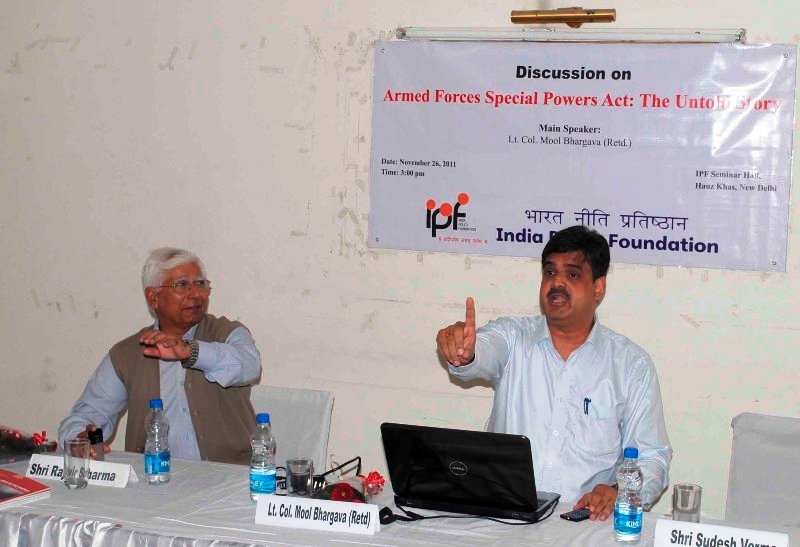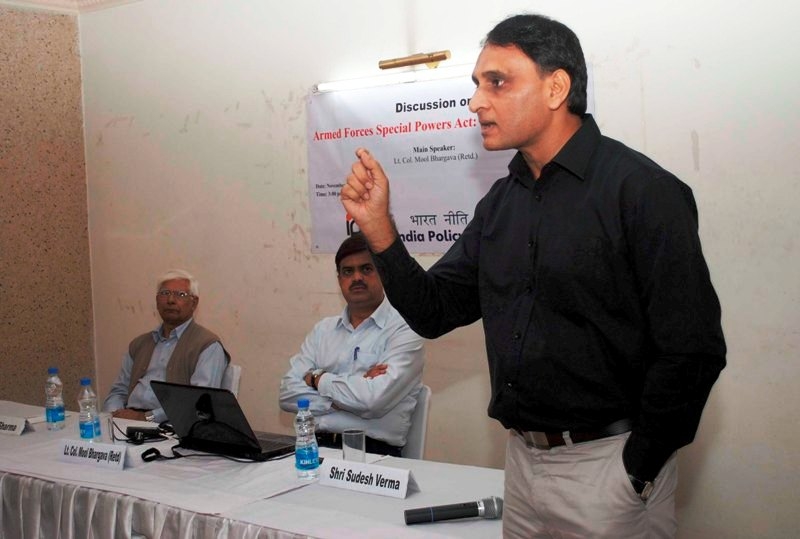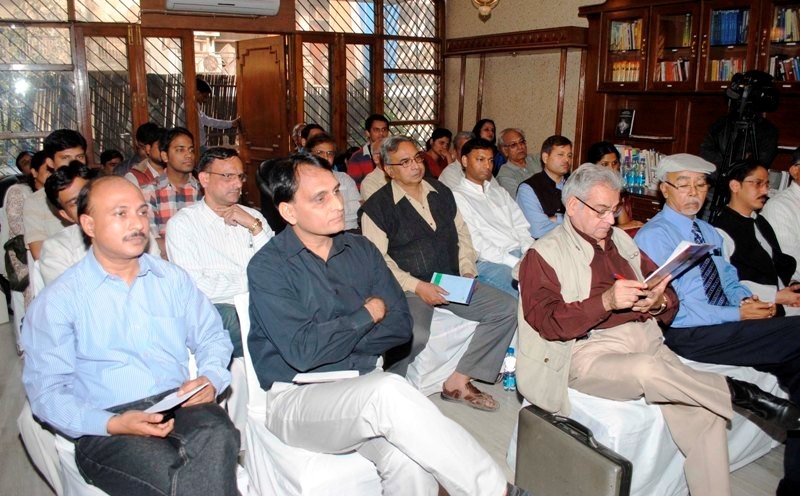Armed Forces Special Powers Act: The Untold Story
Total Views |
Chair: Prof Rajvir Sharma, Delhi University
Speaker: Lt. Col Mool Bhargava (Retd .)
November 26, 2011, IPF Seminar Hall
The Indian Army too has become a victim of proxy wars designed to defame well established institutions of the country. This has been the outcome of the discussion on Armed Forces Special Power Act organised by India Policy Foundation (IPF). The speakers accepted that there might be some aberrations of the Army being on the wrong side but they are exceptions and blown out of proportion.

Presenting the background of the discussion; Prof Rakesh Sinha, IPF contended that the campaign against AFSPA is part of a larger conspiracy to discredit and defame Indian Army. In the 1980s the People’s Union for Civil Liberties (PUCL) published a report accusing the army of rape in the Valley. The report was not circulated in India but it reached Pakistan. Its representatives at UN unleashed a propaganda against the Indian Army. The report was not available to the Indian representatives who were on the defensive. The Army constituted a civilians’ committee led by BG Verghese to investigate the allegation made by the PUCL’s report. Interestingly, the BG Verghese Committee found all accusations baseless. This was a beginning of anti-army propaganda masquerading as civil right/human rights activism.

Omar Khalidi, Regional Vice-President of the American Federation of Muslims of Indian Origin, in his book, Khaki and Ethnic Violence in India, tried to polemically prove that the Army is predominantly Hindu and there is a bias against Muslims in the Army. It was nothing but the extension of propaganda in the academic work. Then it was the turn of the government to satisfy the propagandists that the political establishment was prepared to their line.

The Sachar Committee, formed by the Govt of India in 2005 to know the conditions of Muslims in the country, unfortunately accepted the premise of Khalidi’s book. Sachar Committee demanded statistics of Hindus and Muslims in the Army. Thus the Committee raised the question on its social base. A debate was started in the media by the vested interests on representation of Muslims in the Army. It was intended to damage the secular image of the Army. Unperturbed by such propaganda and pressure from the Committee as well as the Ministry of Defence, the then Army Chief General JJ Singh outrightly refused to oblige. He firmly said that the Army is one entity, a patriotic unit beyond any sectarian, caste and linguistic identity.
There has been concerted efforts by such elements to prove that the Army has been a habitual offender and frequent violators of human rights. Prof Sinha further said that now vested interests and some politicians as well as so-called human rights activists were questioning the Armed Forces Special Powers Act. It is an effort to demoralise the armed forces .
Bhargava said that the Army has been known for following exemplary code of conduct even in its overseas assignments. The allegations are aimed at weakening the Army which is discharging its duty of safeguarding the borders against external aggression as well as against internal disturbances in conflict areas. In certain North-East areas democratic functioning has been restored thanks to the role played by the Army by containing the insurgency activities. However, it is for the Government to decide the right time when it is fully satisfied that any complete normalcy has been restored to any particular region that the forces, also doing the duties of the police and administration under the special powers, could be withdrawn .
Coming after objections and repeal of POTA, he said that the demand to annul AFSPA and pull out the Army from Jammu and Kashmir would only aid terrorists sneaking in from across the borders. Sections of politicians and media supporting the move is also cause for concern. Earlier the bogey of excesses used to be raised by certain human rights activists but it is of late that politicians have joined the chorus, he added. There have been just a total of less than 1000 cases of charges against soldiers in J&K and 92 percent of the cases have been proved false.
Prof Rajvir Sharma said that the special powers of the Army have helped several areas return to normalcy. New ways need to be found to effectively use the media and the New Media to fight terrorism. Sushma Wahengbam asked if the army deployed to check the insurgency in the North-East when the civilian administration failed, is also facing the charges of committing atrocities, what would be the next alternative? Lt Col added that there is no problem in withdrawing the AFSPA but the people must ensure security of the people and must guarantee that Army is not called within six months again. Those who have been demanding withdrawal of AFSPA should be held accountable in case Army is called again .
Sushama Wahengbam welcomed the guests and Jayram Viplav delivered the vote of thanks. Among the audience a large number of scholars and teaching faculties as well as journalists were present. Rajendra Singh Rana, MP, Prof Harsha, Prof Suman Kumar, Prof Smita, Manmohan Sharma, Satish Pednekar, Syed Asdar Ali, Miss Madhvi Shree, Amitabh Shrivastav, GD Sharma were among those who actively participated in the interactive session.